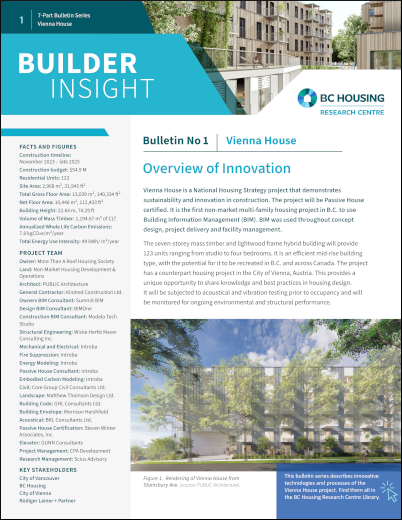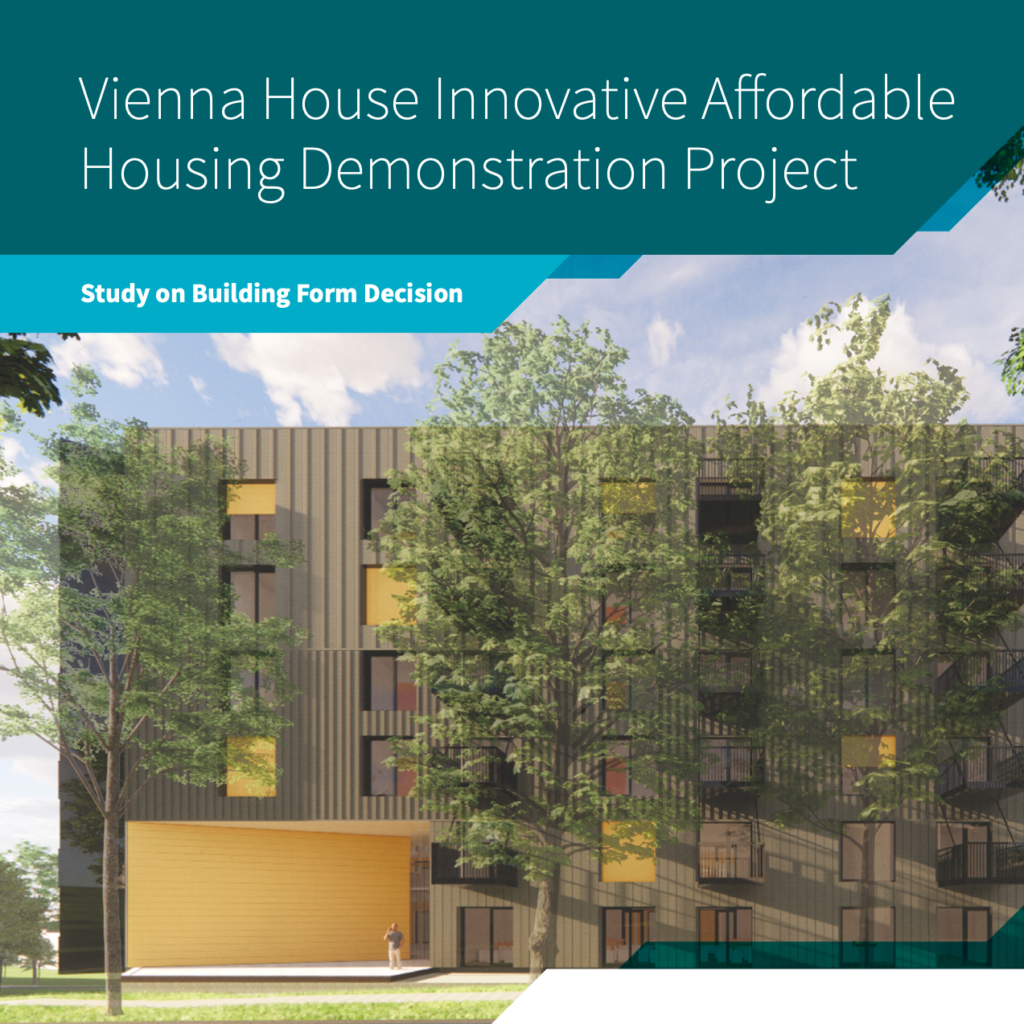The Vienna House community will yield a wealth of lessons. Here are a few research projects in the works that will seek to capture them.
BC Housing Research & Reports
Builder Insight Bulletins Series

A series of seven Builder Insight bulletins provide information how the Vienna House project is putting innovation to work. BC Housing is hosting these bulletins at its Research Centre Library, and we are pleased to make them available here as well.
Housing For All

This exploratory research report studied the social-economic impacts of social housing models in Vienna, Austria, to assess their applicability to Vancouver.
DOWNLOAD: Housing For All
Study on Building Form Decision

This report summarized the considerations and decisions that resulted in the configuration of the project. The authors distilled their findings from interviews with key members of the Project Steering Committee during the schematic design stage.
DOWNLOAD: Study on Building Form Decision
IDP Workshop 1 Summary
DOWNLOAD: IDP Workshop 1 Summary
DOWNLOAD: IDP Workshop 2 Summary
IDP Workshop 3 Summary
DOWNLOAD: IDP Workshop 3 Summary
DOWNLOAD: IDP Workshop 4 Summary
Design for Disassembly
DOWNLOAD: Design for Disassembly
BIM Requirements Specification V1.0

BC Housing is implementing a Building Information Management (BIM) process to develop accurate 3D models of projects that can be used throughout the life cycle of its facilities. This document establishes the technical requirements and workflows that support the generation of BIM design models.
DOWNLOAD: BIM Requirements Specification V1.0
Integrated Building Adaptation and Mitigation Assessment (IBAMA)
In partnership with BC Housing, this University of British Columbia-led project investigated how the design, construction and operations of multi-unit residential buildings such as Vienna House can effectively integrate both climate mitigation and adaptation considerations. The need for this integration stems from the unintended consequences that may result from adaptation policies and practices being developed separately, or as add-ons to more established green building systems for optimizing buildings’ environmental performance.
Mobilizing Building Adaptation and Resilience (MBAR)
Mobilizing Building Adaptation and Resilience (MBAR) is a multi-year, multi-stakeholder knowledge- and capacity-building project led by BC Housing; more than 30 organizations are participating and contributing. MBAR addresses climate impacts on buildings and neighbourhoods. BC Housing expects that knowledge created by the MBAR initiative will help building owners address and minimize the impacts of climate change on buildings and the people who live in them.
UBC Collaborative Research Group
Design Phase Overview
The UBC Sustainability Hub produced this presentation on its Vienna House Design Phase Case Study work in March 2023. The Vienna House project team and numerous stakeholders contributed to this resource.
DOWNLOAD: Design Phase Overview
A research collaboration between the UBC Sustainability Initiative and faculty members from the UBC Department of Civil Engineering studied the Vienna House design phase, and documented the challenges, solutions, and lessons learned.
As part of a larger research project led by the BC Housing Research Centre, the UBC Collaborative Research Group worked with researchers and consultants from other organizations to push the boundaries of sustainability and innovation.
The experiences and lessons learned from Vienna House, including knowledge exchange between the City of Vancouver and the City of Vienna, have the potential to inform future sustainable and affordable housing projects in Vancouver, the province and beyond. For this reason, knowledge transfer and dissemination has been—and will continue to be be—a key aspect of the project.
The UBC research team developed education materials that described key innovations. These resources will support the project’s aim of becoming a template for future affordable and sustainable housing projects, as well as creating the policies and regulations needed to support them.
FPInnovations
FPInnovations (FPI) is a private not-for-profit research organization that creates solutions to support the Canadian forestry sector’s global competitiveness. The Sustainable Construction group carries out state-of-the-art research, develops advanced technologies, and delivers creative solutions for wood-based building systems.
This program measures the performance of innovative wood-based buildings using non-destructive testing and monitoring methods. The organization does so to:
- Compare field measurement results with design expectations to improve the designs of future buildings,
- Validate modelling to improve design tools, and
- Acquire field performance data needed to fill priority knowledge gaps and to support regulatory and market acceptance for innovative (e.g., taller, larger, energy efficient, prefabricated) wood buildings.
During Vienna House construction, FPInnovations may test for building lateral vibration, floor vibration, and acoustics. On a longer-term basis, the organization may monitor durability, building envelope performance, occupant comfort, energy efficiency, and building lateral performance.
PUBLIC: Architecture + Communication
PUBLIC: Architecture + Communication produced this report on adjustable exterior shading devices for residential windows; it offers a summary of product types currently available in the Metro Vancouver market. The report finds that adjustable exterior shading is one of the most effective tools to achieve occupant thermal and visual comfort in summer months by controlling solar radiation—which contributes significantly to overheating. As such, it is makes sense for most residential developments in British Columbia.
DOWNLOAD: Study of Adjustable Exterior Solar Shading Options for Multi-Unit Residential Projects
SCIUS Advisory
SCIUS Advisory produced this study to investigate the possibility of using a hybrid Cross Laminated Timber (CLT) and Cold Formed Steel (CFS) system on the Vienna House project. This report highlights the features and potential applications of this hybrid approach. Timber Engineering Inc. produced a technical analysis as a separate study; it is provided as an appendix.
DOWNLOAD: Vienna House Cross-Laminated Timber and Cold-Formed Steel Suitability Assessment
Integral Group
Integral Group conducted a study for the City of Vancouver examining the options for providing domestic hot water at Vienna House using heat pumps that use carbon dioxide (CO2) as the refrigerant. This study explored the use of three different and emerging CO2 heat pump products that are new to the Vancouver market.
DOWNLOAD: CO2 ASHPs for Domestic Hot Water










